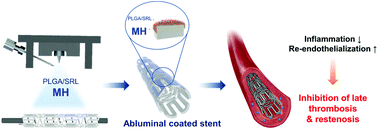Augmented re-endothelialization and anti-inflammation of coronary drug-eluting stent by abluminal coating with magnesium hydroxide†
Abstract
Drug-eluting stents (DESs) have been widely used as a treatment approach for coronary artery diseases. Generally, conventional DESs were fully covered with drugs and biodegradable polymers on both abluminal and luminal layers (i.e., conformal coating). However, uncontrolled drug release from the luminal drug-coating layer of the stent is known to inhibit re-endothelialization. Furthermore, the acidification of the surrounding tissue by the decomposed coating polymer causes inflammation, resulting in restenosis and late thrombosis. To overcome these limitations, here we demonstrated a functional DES coated with poly(lactic-co-glycolic acid) (PLGA), sirolimus (SRL), and magnesium hydroxide (Mg(OH)2, MH) precisely only on the abluminal layer. The acidic neutralization effect of MH was elucidated by measuring the pH change of the fabricated film in PBS solution. In an in vitro cell study, the stent coated with MH exhibited higher compatibility with human coronary artery endothelial cells (ECs) and a lower inflammation score as compared to the control stent. Finally, in an in vivo large porcine model, the abluminal coated DES with SRL and MH showed excellent re-endothelialization and anti-inflammatory and anti-thrombotic effects. In conclusion, it is believed that this approach has great potential for the development of functional DES for the treatment of cardiovascular diseases.



 Please wait while we load your content...
Please wait while we load your content...